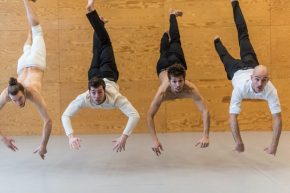How Danyèl Waro from Réunion discovered folk music as a mean of fight against oppression
In the first twenty years of my career, playing maloya was something to fight for, not to live from – says Danyel Waro, the “proud bastard” of Réunion.
In the first twenty years of my career, playing maloya was something to fight for, not to live from – says Danyel Waro, the “proud bastard” of Réunion.
He created an own universe, went on his own path, and after his poetry arrived to collective consciousness, no one could think the same old ways anymore.
Innovative spirit, rediscovery of forgotten pieces, playing at unusual places, contributing to Polish-Hungarian siblinghood: this is the Erdődy Orchestra.
Contemporary artist Minyo Szert’s creative process is a time-limited, analogue photographic performance in the presence of a live audience.

It will work out very well in Trafó to awake feelings with the mere method of looking at people – says Alexander Vantournhout.
Singer Mbene Diatta Seck, talking drum master Modou Mbaye and dancer Fatou Wore Mboup are joined by legendary veteran characters from the Dakar scene.
For “Coexist”, Hód, along with her company Hodworks, and Bremen based dance company Unusual Symptoms collaborate with each other for the first time.
I felt like the bottom of my world fell out. How was I supposed to break down the news to my parents? What was I supposed to tell them?
Rau uses the biography of the Belgium’s most notoriously shameful criminal to reflect on (re)presentation of human feelings on stage.
Rumi always returns us to the quiet, reflective state of Khamush in the final strophe – this is to allow ’the giver of speech to speak’.
I’m playing the piece with recordings doing one part and me the other. I’m alone on stage, but I’m not playing alone – says drummer Julian Sartorius.
By continuing to use the site, you agree to the use of cookies. more information
The cookie settings on this website are set to "allow cookies" to give you the best browsing experience possible. If you continue to use this website without changing your cookie settings or you click "Accept" below then you are consenting to this.